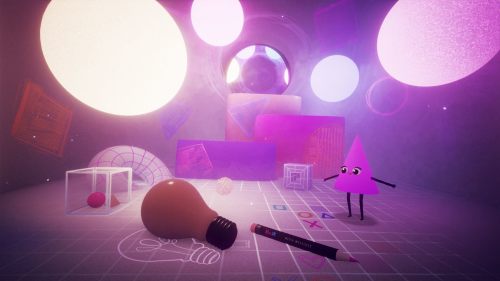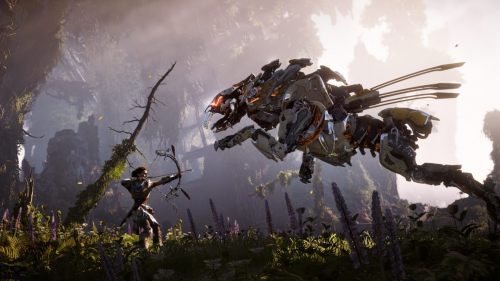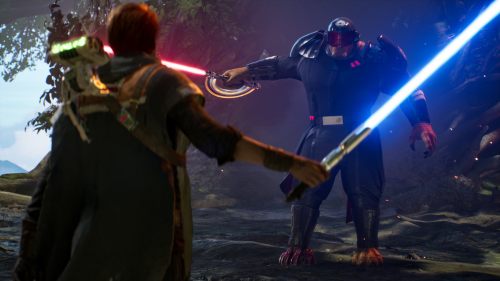HORIZON: ZERO DAWN Game Review: A World Worth Fighting For
I was so ready to hate Horizon: Zero Dawn. Though an original property, its status as yet another open-world action game in the Arkham/Assassin’s/Mordor mould - not to mention its seemingly randomly-generated title - made me groan with dread. “Hooray,” I didn’t think. More climbing up towers to unlock an increasingly cluttered map; more taking out enemy camps to unlock fast-travel points; more crafting ever more-capacious pouches, expanding skill trees, and collecting scrap. This was Sony’s next big PlayStation exclusive? A post-apocalyptic Far Cry clone? Really?
I was right, and yet I was so wrong. Horizon: Zero Dawn indeed follows the same tiresome structure of other recent open-world games, yet does neat things to freshen up almost everything within, while telling a story that pushes it well above the pack. The result: a dazzlingly imaginative role-playing game more akin to a Witcher than an Assassin’s Creed, full of genuine surprises. Even the fucking title makes sense.* Who knew?
Horizon: Zero Dawn derives much of its appeal from its world-building. Guerrilla Games has created a genuinely absorbing world that demands to be explored. It’s not post-apocalyptic but “post-post apocalyptic,” closer to Cloud Atlas’ far-future storyline than to Fallout. The landscape is dominated by plants, small animals, and large robotic creatures, with humanity reduced to small, technophobic tribal societies living atop the ruins of the past. The origins of this state of affairs - and those of protagonist Aloy, whose name owes an un-subtle debt to the Eloi of The Time Machine - form the story’s central mystery.
Visually, Zero Dawn’s vistas are spectacular - swampy jungles, sand-struck mesas, snow-capped mountains, glittering gold cities - but it’s the stories behind them that make the world special. There are two sides to every element: its real history, and the charming, often naive mythology ascribed by the surviving tribes. Each tribe has a different ideological outlook (supported by varied, bizarre costumes and armour), but one thing that unites them is a fear of - and obsession with - “the Metal World” of the past. This far removed, people struggle to divine the purposes of ancient artifacts. After all, what does an old company-branded coffee mug mean to someone with no experience of coffee - or of corporations?
Marketing demands that open-world games have at least one unique, killer feature. Shadow of Mordor has the Nemesis AI system; Mad Max has high-octane vehicular combat; Watch Dogs has hacking. Zero Dawn’s back-of-the-box feature is its menagerie of robotic creatures. It’s a mechanical bestiary to match The Witcher, all based on one or more animals without quite replicating them in robot form. Smaller, more docile machines move with grace or goofiness, while their larger cousins feel truly dangerous. Some communicate. Others keep to themselves. All have a distinct sense of personality - they’re triumphs of design and animation.
Unsurprisingly, most of Aloy's interactions with machines involve combat. She can tame and even ride some of them, but most are hostile by default (and none are pattable). Luckily, although fighting human enemies is as boring here as anywhere, robot combat is deep and tactical, making for intense and drawn-out fights. Each encounter has multiple means of approach. You can fight using Souls-lite melee combat, complete with dodge-rolls (my kingdom for a lock-on feature, though); you can stealth your way past; reprogram machines to fight one another; use an array of traps, snares, bombs, and elemental attacks; or chip away using ranged attacks. Each machine type is assembled from discrete components, each granting it special abilities; these can be torn off, disabling that ability and even granting Aloy chances to use the machines’ own weapons against them. This all encourages tactical, even surgical play. The larger skirmishes have all the exhilaration and scale of boss fights, generated entirely by the game’s systems. Damn, it's fun.
Much to my delight, Zero Dawn is heavier on narrative than I expected, both environmentally and in its quest design. The main storyline involves uniting multiple tribes against a sect of techno-cultists, forcing Aloy to navigate clashing belief systems and political structures. Furthermore, each major locale contains a raft of sidequests, all fully-voiced by unique characters of welcome diversity. (So hefty is the volume of voice acting, in fact, that the seemingly auto-generated facial animation often fails to match its idiosyncrasies.) Some of the game’s most surprising moments come in these sidequests, like talking down an aging military hero bent on going out in a blaze of glory, or comforting a young woman whose secret lover is on the wrong side of a civil war. Even the “find my missing sheep” errands are leavened by the characters hosting them; no joke, the game’s two funniest characters appear in such a quest.
Alongside the present-tense adventure is the sci-fi backstory of Zero Dawn’s apocalypse. Revealed through cutscenes, environmental clues, and bountiful narrative collectibles, it’s a series of global tragedies that owes as much to The Matrix as to Mad Max, extrapolating its future history to a World War Z (the novel) level of detail. The revelations that confront Aloy are bold and extremely dark, ranging from absurd, detached nihilism to flat-out existential horror. Though the oddly truncated action climax pulls many of its punches, failing to match the impact of the second act’s paradigm shifts, taken as a whole, this is a sci-fi epic that stands up with some of the best. Zero Dawn offers powerful, urgent commentary on hubris and humanity that deepens the more you engage with it. Mark my words: the way to play this game is to absorb every piece of text, imagery, and audio you can. You don’t want to miss the beautiful, sad, darkly funny writing on offer.
Sadly, the character at the centre of all this is something of a cipher. Aloy (Life is Strange’s Ashly Burch, with mo-cap by Amanda Fairey and Kezia Burrows) has a lot going for her as a character: she’s smart, inquisitive, and excited about discovery, with badass red hair and a whole lot to prove. An outcast, she’s created (purely coincidentally) in the Rey-from-Star-Wars mould, right down to her mysterious parentage and refreshing lack of sexualisation. But although Aloy is more vocal than most video game protagonists, we’re rarely given a glimpse into her feelings. Granted, Aloy’s stoicism is likely driven by the same player-first ethos that renders other RPG protagonists emotionally neutral, but given how personal the story gets, it feels wrong. It’d be nice if Aloy expressed herself more than in just player-determined, dialogue wheel-driven “expression moments”. She’s pretty cool - I just wish we got to know her a bit more.
Perhaps Horizon: Zero Dawn’s most pleasant surprises come in the constant, welcome tweaks it makes to tired gameplay tropes - at least after its somewhat slow start. The map’s filled with icons denoting a slew of activities, yes, but Guerrilla has managed to vary and add meaning to nearly all of them. You’ll still climb towers to reveal map information and delve into dungeons for upgrades, but the towers are mobile, giraffe-like robots, each in a markedly different setting with unique challenges, while the dungeons deepen the game’s lore and even tell their own micro-stories. Even the ubiquitous collectibles are lent extra meaning, each and every one rewarding players with unique narrative content. About the only thing Guerrilla didn’t fix is the scrounging and crafting system, which still requires altogether too much fiddling about in inventory menus and looting every corpse, crate, plant, and animal in sight. If I never have to craft another fucking ammo pouch, I’ll die a happy - if incapacious - man.
Guerrilla Games’ first foray into open-world game design is an explosion of ideas, staking a claim on the genre in ways that hopefully will force its competitors out of stagnation. For the first time in ages, an open-world game gave me the thrill of combat and the wonder of discovery, packing unexpected emotional gut-punches to boot. It’s a real feather in Sony's cap, and the only game in recent memory that’s kept me up until 5 A.M. on the regular. Horizon: Zero Dawn is not just a great game - it's straight-up great science fiction. I pray we’ll see this much inventiveness and imagination in the inevitable sequel.
* I'd probably just call it Zero Dawn, though.



